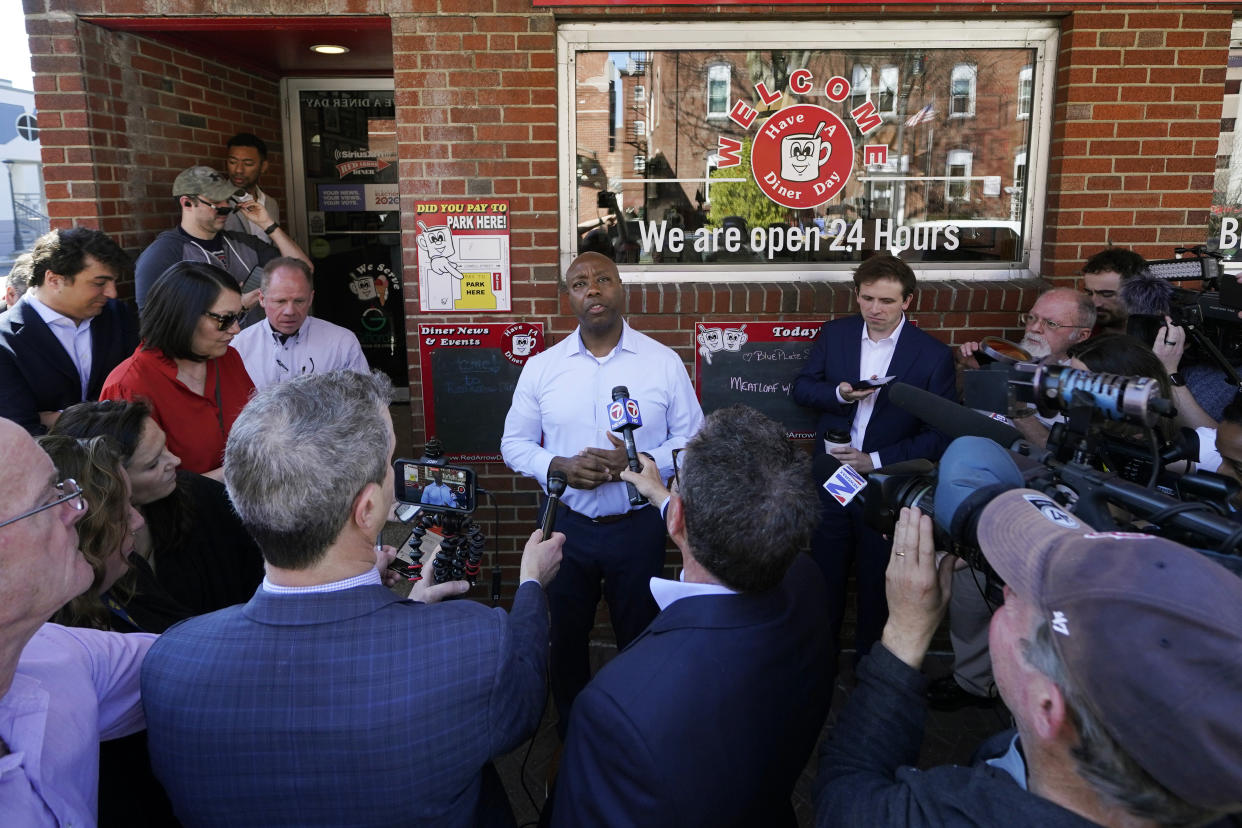Tim Scott's 2024 presidential ambitions collide with Republican abortion problem

Sen. Tim Scott’s evolving answers on abortion as he begins his presidential campaign show the difficulties facing Republicans as they attempt to navigate the issue ahead of the 2024 election.
While the South Carolina Republican has been staffing up for a potential run and visiting early primary states for months, he formally announced an exploratory campaign for the 2024 GOP nomination on Wednesday. As one of three Black senators and one of the most prominent Black Republicans, Scott is a unique figure in a presidential race in which former President Donald Trump has extended his lead over the man considered to be his closest rival, Florida Gov. Ron DeSantis.
As part of the exploratory campaign launch, Scott did a series of interviews. In one with CBS News published Wednesday, he repeatedly sidestepped questions on the topic of reproductive rights. The issue has proved a difficult one for Republicans since Roe v. Wade was overturned last summer.
GOP Sen. Tim Scott declines to say whether he supports Sen. Lindsey Graham's proposed 15-week federal abortion ban.@CHueyBurns: "If you were president, would you advocate for federal limits?"
Scott: "I'm 100% pro-life."
Huey-Burns: "So, yes?"
Scott: "That's not what I said." pic.twitter.com/SjXUP0gqIh— CBS News (@CBSNews) April 12, 2023
"Do you think the federal government should be involved with something like what Lindsey Graham is proposing?" asked reporter Caitlin Huey-Burns, referencing a 15-week federal ban proposed by Scott’s fellow South Carolina senator last year.
"There's no question that we're gonna have a lot of folks talk about legislation from a federal perspective, but what I've heard so far, and what I've seen in the Senate, aren't proposals,” Scott replied, stating that Democrats were pushing what he considered to be extreme abortion policy.
"But if you were president, would you advocate for federal limits?" asked Huey-Burns.
Scott replied, "So once again, 100% pro-life, and I do believe …” but when Huey-Burns pressed him with “So, yes?” he responded, "That's not what I said."
In 2021, Scott co-sponsored a bill proposed by Sen. Rand Paul, R-Ky., that would guarantee fetal personhood — giving rights to a fetus at the moment of conception and banning abortion completely.
Scott refined his position in an interview released Thursday morning with WMUR9, a New Hampshire outlet, saying he supported a 20-week federal ban on abortion. Twenty weeks is less restrictive than the total bans or six-week bans that Republicans have put in place in a number of states, but it’s also prime attack fodder for Democrats. Within minutes of the clip being posted to Twitter, both the Democratic National Committee and American Bridge 21st Century, a pro-Democrat super-PAC, highlighted it. Scott had previously supported a 20-week ban proposed by Graham in 2021.
In a 1-on-1 interview with @WMUR9, Sen. Tim Scott @votetimscott says the Dobbs decision left abortion policy to the states, but if he's President he says he would sign a 20-week federal abortion ban into law. #FITN#NHPolitics#WMURpic.twitter.com/fHPGZ4gr5z
— Adam Sexton (@AdamSextonWMUR) April 13, 2023
Scott changed his position again during a live scrum with reporters on Thursday. The conservative outlet Newsmax asked him if he supported a federal abortion ban, to which Scott replied by noting a conversation about abortion and the workforce that he had with Treasury Secretary Janet Yellen at a hearing last year. Scott said he was “100% pro-life, I’ll never walk away from that” but didn’t reply to a follow-up asking for a “clear message.”
It's unknown if the 20-week proposal that Scott mentioned to WMUR would work similarly to Graham’s, which would still allow Republican-controlled states to keep stricter bans while putting a limit on states that want broader reproductive rights. While both senators have criticized Democrats for supporting “late-term abortions” — which is not a medical term — abortions later in pregnancies are very rare (about 1% of all abortions, according to the Kaiser Family Foundation) and are usually tied to health complications.
Staking out even a 20-week ban could potentially hurt Scott and other Republicans in primaries, as some GOP voters support stricter bans that are out of step with national polling. Trump appointed three Supreme Court justices who helped overturn Roe, fulfilling a campaign promise. Meanwhile, DeSantis is set to sign a strict six-week ban in Florida.
But while taking a strict position on abortion can be survived in general elections by Republicans in traditionally conservative states, it has demonstrably benefited Democrats in swing state races since last June’s ruling. Last week, a Wisconsin state Supreme Court election was won comfortably by Janet Protasiewicz, the liberal candidate, after she ran on protecting reproductive rights.

Following Protasiewicz’s win, the Wall Street Journal’s conservative editorial board — which cheered the overturning of Roe — wrote that the issue of abortion was still “politically potent.”
“Republicans had better get their abortion position straight, and more in line with where voters are or they will face another disappointment in 2024,” wrote the board. “A total ban is a loser in swing states. Republicans who insist on that position could soon find that electoral defeats will lead to even more liberal state abortion laws than under Roe. That’s where Michigan is now after last year’s rout.”
Some conservatives have said that the Wisconsin loss wasn’t a sign of abortion’s importance but instead the result of a bad candidate: conservative Dan Kelly, who had lost by an identical margin to a different liberal opponent in 2020. For Republicans to recapture the White House in 2024, either abortion will have to fade as an issue or they will have to land on a middle ground that keeps the base engaged while not completely turning off swing voters.
